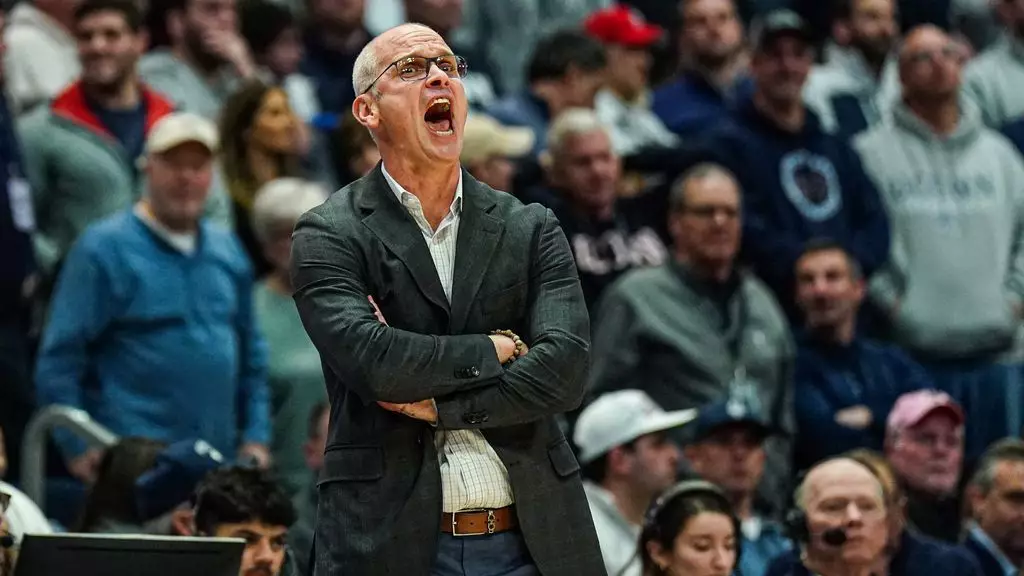In the world of competitive sports, emotions can often cloud judgment, as evidenced by UConn coach Dan Hurley’s regrettable comments following his team’s narrow 77-75 loss to Florida in the NCAA tournament. While it’s natural for a coach to feel compelled to protect their team’s interests, Hurley’s explosive remarks regarding officiating crossed a line that shouldn’t have been breached, even in the heat of the moment.
The reality is that competitive environments, particularly in high-stakes games, amplify stress and frustration. Hurley, known for his fiery demeanor, channeled that energy into a provocation that, while seemingly justifiable by raw emotions, detracts from the professionalism expected at such levels. Yes, losing is painful—especially when it’s your bid for a third consecutive national title—but the manner and the medium of expression are vital in preserving the integrity of the sport.
Referees and Accountability: A Complex Relationship
In Hurley’s defense, the officiating in the NCAA tournament can often appear inconsistent, leaving coaches and players frustrated. However, this does not excuse negative outbursts that undermine the work and professionalism of referees. During post-game interviews, Hurley did commend the officiating, albeit reluctantly, illustrating the conundrum many coaches face in defending their teams while also expressing respect.
In a culture that often encourages pushing boundaries, Hurley’s regret reveals an important lesson: accountability matters. Coaches wield significant influence, and their public comments can resonate far beyond the locker room. Acknowledging both praise for good officiating and frustration over questionable calls could serve as an example of maturity and respect. Instead, the coach risked undermining the respect owed to those overseeing the game—a choice that resonates with unsettling implications.
The Role of Media: A Double-Edged Sword
Media interactions add another layer of complexity to Hurley’s misstep. A recording of his emotional outburst circulated, sparking widespread coverage and debate. The interplay between media and athletes is crucial, yet fraught with challenges. Dan Hurley’s comments were caught on camera, illustrating the unavoidable presence of media in modern sports.
Managers and coaches must be cognizant of their public persona, particularly in accessible spaces. The environment in which off-the-cuff remarks are made has changed dramatically; nothing is truly private anymore. While the spontaneity of emotion is understandable, Hurley’s situation serves as a cautionary tale about being mindful of one’s surroundings. A refined, composed response might have alleviated the discourse and shifted focus back to the game rather than the scandal intertwined in the aftermath.
Internal Dynamics: The Ripple Effect
The fallout from Hurley’s comments extended beyond himself, putting his staff in uncomfortable positions. Athletic communications director Bobby Mullen’s attempt to shield his coach by requesting the removal of the video, followed by an ill-advised threatening comment to the media, reflects the broader implications of a coach’s behavior on their team. Mullen’s subsequent apology suggests a strong bond within the program; however, it showcases that the culture surrounding a coach’s emotional management can lead his or her team into unexpected and contentious situations.
The loyalty exhibited by Mullen hints at an intense internal dynamic, perhaps driven by the fear of losing a competitive edge. Yet loyalty that spills over into reckless defense can compromise professionalism. A delicate balance is necessary, where support doesn’t morph into complicity in poor decision-making. As a leader, Hurley must cultivate a culture that empowers rather than isolates.
Looking Forward: Lessons in Resilience and Growth
While Dan Hurley’s emotional outburst was undeniably regrettable, it serves as an opportunity for reflection. Coaches of his caliber must adapt, learning from these tumultuous experiences and the surrounding fallout. Society often emphasizes winning at all costs in sports, but as Hurley himself conceded, moments of humility offer a chance for growth and enhanced emotional intelligence.
Restructuring how competitive environments are approached—incorporating lessons about personal accountability and public professionalism—is essential. Being an effective coach goes beyond drawing up plays; it requires understanding the weight of one’s words and the resulting implications on players, staff, and fans alike. While Dan Hurley’s moment of indiscretion has garnered criticism, it can also prompt a much-needed dialogue on emotional management and ethical accountability in high-pressure sports settings.

Leave a Reply